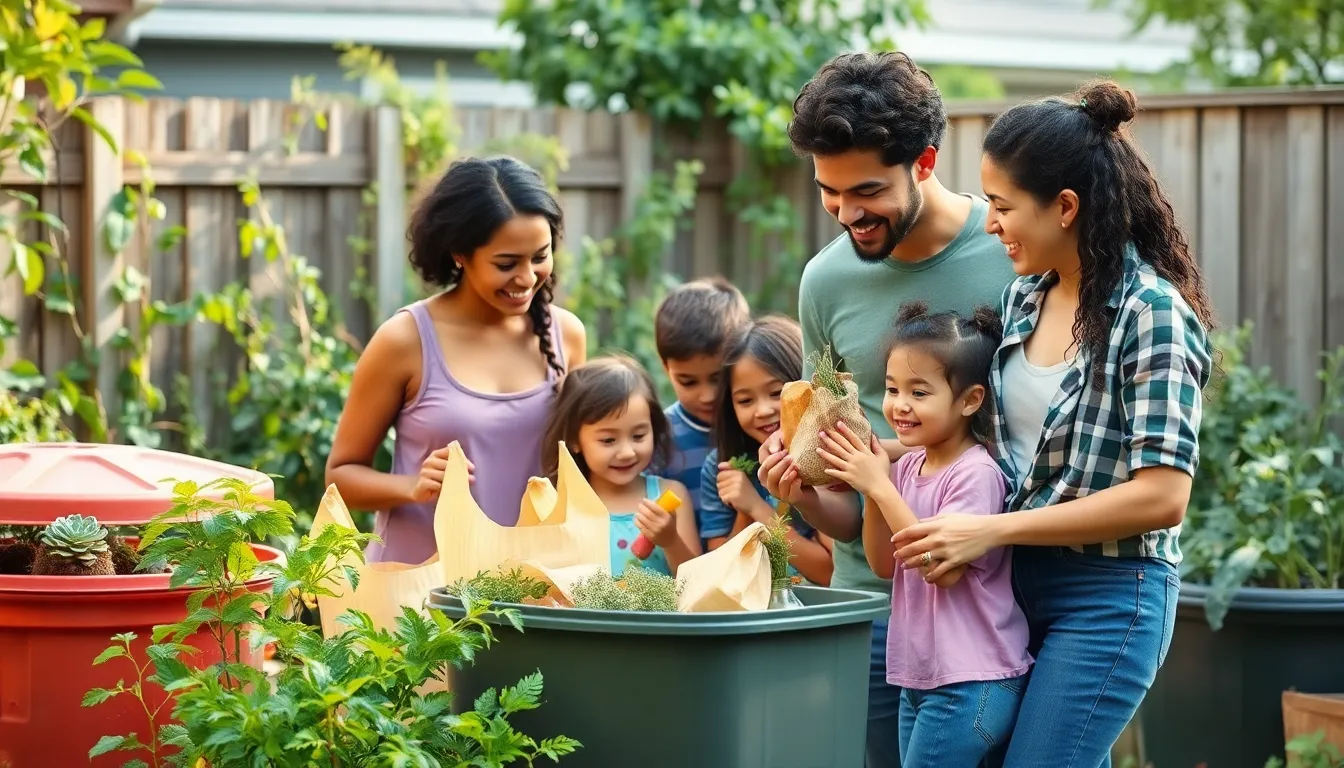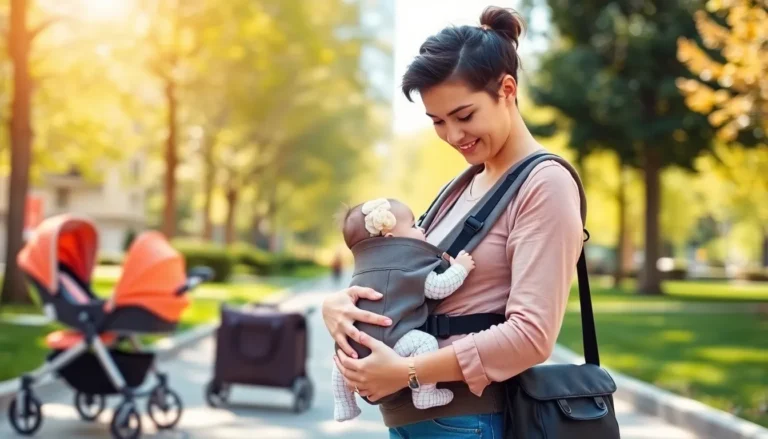Table of Contents
ToggleIn a world where plastic seems to outnumber people, eco-friendly parenting is like a superhero cape for modern moms and dads. It’s not just about saving the planet; it’s about raising little earth warriors who know that recycling isn’t just a trend—it’s a lifestyle. Imagine teaching kids the value of a reusable snack bag while secretly feeling like a parenting rockstar.
But eco-friendly parenting doesn’t have to be all tree-hugging and no fun. With a sprinkle of creativity and a dash of humor, parents can turn sustainability into a family adventure. From DIY crafts that make Pinterest proud to backyard gardening that doubles as a science lesson, eco-friendly choices can be both practical and entertaining. So buckle up—let’s dive into the world of green parenting and discover how to make eco-conscious choices that’ll have both kids and Mother Nature smiling.
Understanding Eco-Friendly Parenting
Eco-friendly parenting emphasizes the importance of raising children with a strong sense of environmental responsibility. Parents adopting this approach incorporate sustainable practices into daily life, teaching children valuable lessons about their impact on the planet.
Definition and Importance
Eco-friendly parenting focuses on practices that support environmental preservation and sustainability. This method not only enhances children’s awareness of ecological issues but also fosters lifelong habits of responsible living. Engaging in recycling, reducing waste, and conserving resources shapes their understanding of environmental stewardship. Parents play a critical role in modeling these behaviors, ensuring children comprehend the significance of their choices. As environmental challenges grow, nurturing eco-consciousness in youth becomes increasingly vital for a healthier future.
Benefits for Families and the Environment
Embracing eco-friendly parenting yields numerous benefits for families and the environment. Families practice healthier lifestyles that promote well-being through nutritious foods and sustainable habits. Engaging in eco-activities strengthens family bonds and encourages teamwork. Additionally, families contribute to reducing their carbon footprints while setting an example for their communities. Environmental impacts decrease when families adopt green choices, such as using reusable items and conserving energy. Significant long-term benefits arise from nurturing environmental awareness, ensuring future generations appreciate and protect natural resources.
Eco-Friendly Parenting Practices

Eco-friendly parenting involves adopting practices that promote sustainability while teaching children about environmental responsibility. Parents can embrace various strategies to cultivate eco-conscious habits.
Sustainable Baby Products
Choosing sustainable baby products benefits both children and the environment. Parents often opt for organic cotton clothing, biodegradable diapers, and non-toxic toys. Brands like Bambo Nature and Green Sprouts offer eco-friendly options that minimize harmful chemicals. Purchasing second-hand items also reduces waste and supports a circular economy. Investing in these products reinforces an environmentally aware mindset from an early age.
Green Cleaning Solutions
Using green cleaning solutions ensures a safe home for families and protects the planet. Many parents turn to natural ingredients like vinegar, baking soda, and essential oils for effective cleaning without toxic chemicals. Brands such as Seventh Generation and Mrs. Meyer’s clean day offer eco-friendly alternatives to conventional cleaners. Regularly utilizing these products safeguards children’s health and encourages eco-friendly habits throughout the household.
Waste Reduction Strategies
Implementing waste reduction strategies proves essential in eco-friendly parenting. Families benefit from adopting practices like composting and recycling, which divert waste from landfills. Parents often involve children in these processes, fostering responsibility and awareness. Using reusable containers, bags, and cloth napkins further reduces single-use waste. Creating a family routine focused on minimizing waste enhances children’s understanding of their impact on the environment.
Raising Eco-Conscious Children
Raising eco-conscious children involves integrating sustainable habits into everyday life. Parents can teach kids the importance of environmental responsibility, creating a foundation for a greener future.
Teaching Sustainability at Home
Modeling sustainable practices fosters awareness in children. For example, when parents recycle or compost, kids learn the significance of these actions. Involve children in household tasks like sorting recyclables and choosing eco-friendly products. This hands-on experience reinforces their understanding of sustainability. It’s beneficial to discuss why certain materials are better for the planet. Make discussions about energy conservation rewarding; turn off lights when leaving rooms together. Engaging kids in these activities cultivates lifelong eco-conscious habits.
Encouraging Outdoor Play and Connection with Nature
Outdoor play nurtures a child’s connection with nature. Nature walks create opportunities for exploration and learning about local ecosystems. Encourage children to participate in community gardening projects, where they learn about growing food sustainably. Observing wildlife enhances their appreciation for biodiversity. Outdoor activities can include picnics with reusable containers, promoting waste reduction. Parents should prioritize unstructured outdoor time; it promotes creativity and physical health while teaching respect for the environment. Such experiences help children understand their place in the world and the importance of preserving it.
Challenges of Eco-Friendly Parenting
Eco-friendly parenting presents challenges that parents must navigate to raise environmentally conscious children.
Cost Considerations
Costs often deter parents from adopting eco-friendly practices. Organic products frequently carry a higher price tag compared to conventional options. Parents may also encounter increased initial expenses when investing in sustainable goods like cloth diapers or energy-efficient appliances. However, long-term savings occur through reduced waste and lower utility bills. Some families find it beneficial to seek out discounts or buy second-hand eco-friendly items, which helps balance budgets while promoting sustainability. Financial support through government programs may also assist families making eco-conscious choices.
Access to Resources
Accessing sustainable resources poses a significant hurdle for many parents. Areas with limited availability might lack stores offering eco-friendly products, making it challenging to find items like organic food or biodegradable cleaning supplies. Parents also struggle to find local recycling facilities or community gardens, which can hinder efforts to instill green habits. Some families might benefit from online shopping options, but shipping products adds to environmental concerns. Building connections with local eco-conscious communities can provide support, helping parents share resources and knowledge effectively.
Embracing eco-friendly parenting not only nurtures a child’s awareness of environmental issues but also fosters a sense of responsibility that lasts a lifetime. By integrating sustainable practices into daily routines and engaging children in creative activities, parents can make a significant impact on their family’s ecological footprint.
While challenges may arise in accessing resources or managing costs, the long-term benefits of eco-friendly choices far outweigh the initial hurdles. Building connections within eco-conscious communities can provide valuable support and inspiration. Ultimately, eco-friendly parenting is a rewarding journey that benefits both children and the planet, paving the way for a healthier future.




